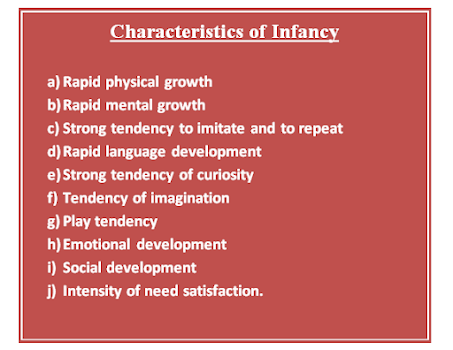Infancy
Meaning of infancy:
Infancy is the shortest period of all developmental
period.
Infancy period begins with birth and stays till the
infant is approximately 5 years of age.
A newborn has a distinctive appearance. The head of
the infant is very large, and the arms and legs are relatively short. Hair on
the head can vary from almost no hair to a head full of hair.
Infants are born with certain characteristics and
abilities already observed. For example: infants have a well developed sense of
smell and they can also communicate their emotions and needs by crying when
they are hungry, uncomfortable, bored or lonely.
Characteristics of
Infancy
During infancy the characteristics are formed from
the view point of physical, mental, linguistic, emotional and social
development.
a) Rapid physical development
- The physical development of an infant from birth to 3 years is rapid (very fast) in comparison to other periods of development.
- The size and weight of infant’s external and internal body parts and organs increase and they accumulate physical strength.
- From 3 to 6 years of age, the physical development of the infant is comparatively slow but the developed organs in this period become stable and firm.
b) Rapid Mental Development
- According to psychologist, mental development during infancy stage is more rapid than in other stages of development.
- In the first 3 years i.e., birth to 3 years the development of brain and mental activities like concentration, sensation and memory takes place.
- And in the last 3 years i.e., 3 to 6 years, these developments become stable and firm and the tendency of curiosity is intense.
c) Strong Tendency to imitate and repeat
- After 1 year of birth, the infant starts imitating the sound and actions of people he/she comes in contact with.
- In the 2nd year, infants imitate the facial expressions (happy, sad, annoyed etc) of other people and in the 3rd year, they imitate others behavior.
- The infant learns the most by imitation and repetition in the stage of development.
- Example: Due to this tendency, infants tend to repeat few lines of songs and learn them by heart.
d) Rapid Language Development
- According to psychologist, infancy is the best stage for language development.
- When a child reaches 1 year of age, s/he starts imitating the sounds that s/he hears and s/he tend to repeat the sounds heard by imitation.
- After completion of 2nd year, infants start repeating small sentences and with the completion of 3rd year, they start expressing their emotions.
- The period of 3 to 6 years of age is the most important period of language development. During this time, infants acquire languages that they come most in contact with i.e., mother tongue or regional language etc.
- In this period, infants learn fast whatever language that they are taught but it should be taught by developing their interest and in a play way.
e) Strong Tendency of Curiosity
- With completion of 2 years of age, infants start developing the tendency of curiosity but due to lack of language knowledge, they fail to express their curiosity.
- Infants from age 3 to 6 years have the strongest tendency of curiosity as compared to any other age.
- As the language development of infants takes place, they start expressing their curiosity and tend to ask of questions to settle their curious minds.
f) Tendency of Imagination
- Infants of age 3 to 6 years have the strongest tendency of imagination and sometimes they get lost in their imaginations.
- On the basis of his observations and experiments, Thorndike had raised a fact that infants of age 3 to 6 years remain in half dream state.
g) Play Tendency
- There are four main characteristics of play tendency: interest, independence, pleasure and actions.
- Infants like to do actions (i.e., play) in which they are interested, makes them feel independent and gives them pleasure.
- During infancy, they do not like anybody’s interruption while they play i.e., they like to play independently and as long as they get pleasure out of it.
- Psychologist have laid emphasis on taking advantage of infants play tendency in their learning by including play way methods while teaching them.
h) Emotional Development
- Emotional development of infants starts during infancy.
- When the infant is new born, they are dependent on other to care of them and give them love and sympathy. As they get a little older, they start expressing their love and affection to others.
- They also show other emotions like annoyance and anger when stopped from doing something, fear when they feel danger etc.
- Their emotions become stable till 6 years.
i) Social Development
- Initially, the behavior of infants is instinctive.
- As they come in contact with other people, they start interacting with them and their social development starts.
- At 2 to 3 years of age, infants start developing interest and disinterest in people they come in contact with. They like (or dislike) sharing their food and play with people according to their liking (or disliking).
- At the age of 3 to 6 years, infants start distinguishing between right and wrong; learns language to adjust in society; learns desirable behavior patterns and in this way their socialization starts.
j) Intensity of Need Satisfaction
- Adequate development of infants depends on their need being satisfied.
- Physical development of infants in rapid during infancy and they require proper nutritional diet for it. Whenever the infant feels hunger, they want their need for food to be satisfied.
- They have strong tendency of curiosity so they want their questions to be answered quickly and accurately.
- In this stage, their social and emotional development starts so they need opportunities to interact and express their opinions, ideas and emotions with others; and also to listen to other people’s perspective.
·

Comments
Post a Comment